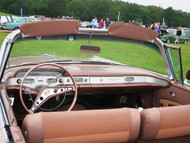The Evolution of Chevy Interiors: A Journey Through Time
Posted by Collectors Team on Nov 17th 2024
Why Your Chevy’s Interior Is the Real Star
When it comes to classic cars, the interior is where the magic happens. It’s not just about shiny paint or big engines—it’s about the feel of the seat, the grip of the wheel, and the memories made behind the glass. Whether you're tearing down the highway or showing off at a car meet, the interior is where you spend most of your time. That’s why it’s more than just looks—it’s what makes the car yours.
Chevy’s history of interiors is a story of innovation, comfort, and pure style. Let’s take a ride through the decades and see how Chevy’s interiors went from basic to downright awesome.
The Early Years: Straightforward and Tough
When Chevy rolled onto the scene in 1911, interiors were no-frills and all function. Think bare metal, wooden steering wheels, and bench seats that got the job done. It wasn’t about comfort; it was about getting you from A to B without breaking down.
By the 1920s, Chevy started stepping things up with padded seats and enclosed cabins, showing that even the working man deserved a bit of comfort.
The 1940s and 50s: Flash and Flair
The post-war boom brought big changes to car interiors. Chevys like the Bel Air weren’t just cars—they were rolling works of art. With two-tone seats, chrome trim, and built-in radios, the interiors of the 40s and 50s were all about style and convenience.
Chevy started throwing in options like electric windows and air conditioning, making it clear they weren’t just building cars; they were building experiences.
The 1960s and 70s: Muscle Meets Safety
The 60s brought in the muscle car era, and Chevy was right there in the driver’s seat with cars like the Camaro. Interiors got sporty, with bucket seats, center consoles, and slick dashboard layouts that made you feel like you were in a cockpit.
But it wasn’t all about looks. Safety started to matter, too. Seat belts, padded dashboards, and even early airbags started showing up, proving Chevy cared about keeping you alive as much as getting you there in style.
The 1980s and 90s: Tech Takes the Wheel
By the 80s and 90s, it was all about tech. Chevy started adding digital dashboards, CD players, and better climate controls to their cars. They also made interiors more driver-friendly, with layouts that kept everything in reach.
And let’s not forget—this was the era when cup holders started to matter. Smoking compartments were out, and practical storage was in.
Today’s Chevys: Luxury Meets Tech
Modern Chevys are built for comfort, convenience, and a little bit of showing off. Leather seats with heating and cooling, touchscreen systems, and smartphone hookups have turned these rides into rolling living rooms.
Chevy’s even gone green, using eco-friendly materials to keep the planet in mind while still delivering high-quality interiors. And with extras like panoramic sunroofs and premium sound systems, these cars are as much about the ride as they are about the destination.
Why the Interior Matters
Your car’s interior isn’t just where you sit—it’s where you live while you’re on the road. It’s where you crank your favorite tunes, talk shop with your buddies, or just enjoy the ride.
If you’re into classic cars, keeping the interior sharp isn’t just about looks—it’s about keeping the heart of the car alive. From reupholstering seats to replacing weatherstripping, every little detail counts.
At Collector’s Auto Supply, we’ve got the classic Chevrolet parts you need to bring your interior back to life.
Ready to Restore?
Chevy’s interiors have come a long way, but no matter the decade, they’ve always been the heart of the car. If you’re restoring a classic or just sprucing up your ride, don’t cut corners on the interior—it’s what makes your car yours.
Check out our collection of classic Chevrolet parts and make your Chevy’s interior just as unforgettable as the rest of the ride.
Because a great interior isn’t just something you see—it’s something you feel every time you hit the road.

